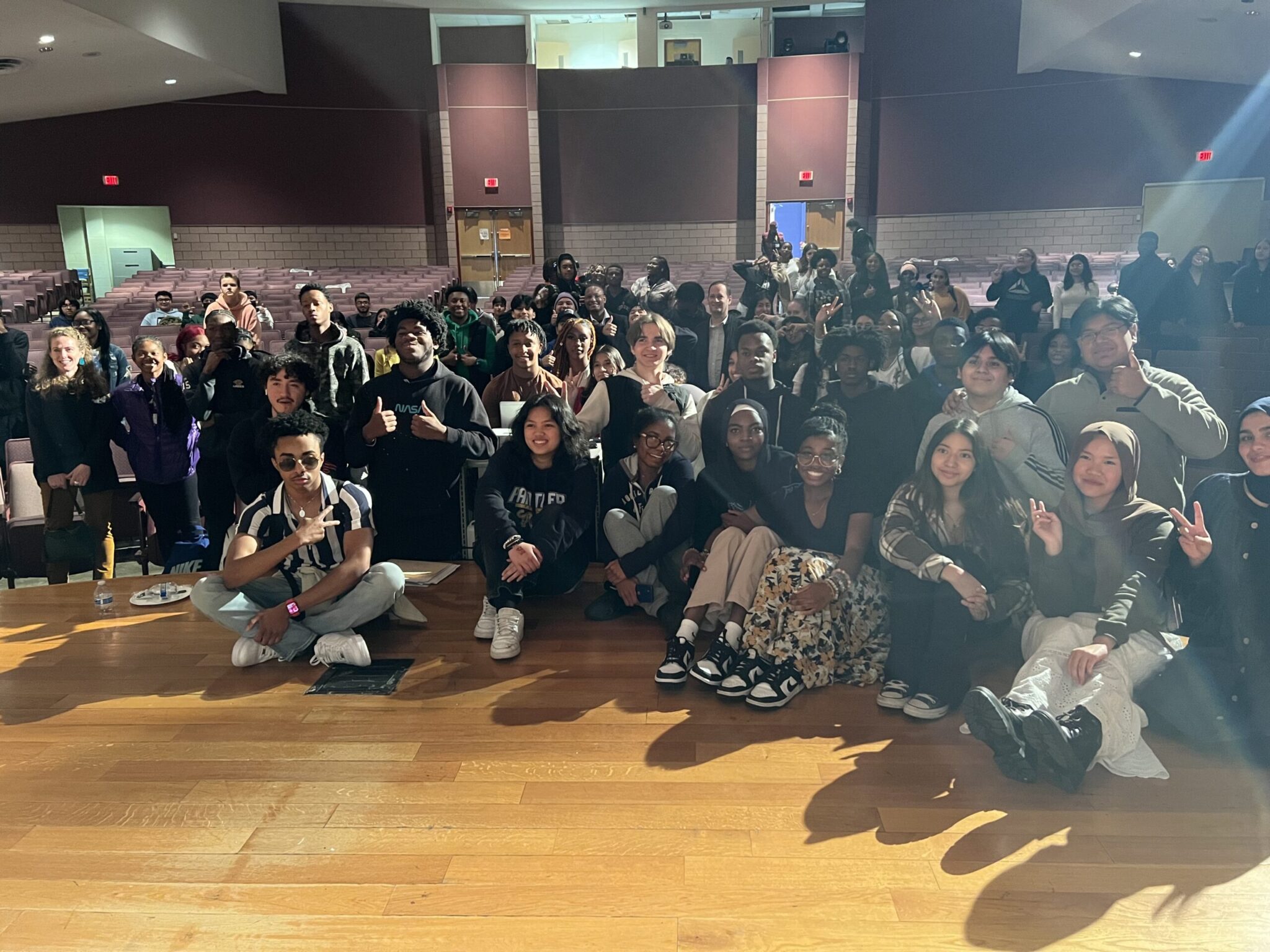USAID and Career High School host a conference on environmental justice
USAID Counselor Clinton White returns to New Haven to emphasize the urgency of climate change and encourage young voices on the matter.

Brooklyn Brauner, Contributing Photographer
Speakers from the United States Agency for International Development, Yale University and the Career High School faculty addressed over 170 students on Oct. 26 to discuss the urgency of climate change and the importance of environmental justice.
USAID Counselor Clinton White, a former New Haven resident, returned to the city to advocate for improved climate change interventions and encourage high school students to get involved. He collaborated with his previous eighth-grade teacher and soccer coach, James Osborne, who currently works at Hill Regional Career High School as a history teacher, to host the second annual conference centered around environmental justice.
“Seeing these young kids and how their minds have begun to change, putting a bit more context about the fact that these things are happening in their neighborhoods, but also on a wider spectrum, does show how we begin to build bridges between global work and domestic work,” White said.
For White, it is important to encourage and respect the input of young people in conversations regarding environmental justice, as they, too, are impacted and have the ambition to contribute.
USAID Youth Coordinator Sarah Sladen commented on the importance of engaging and mobilizing the youth in the face of such prevalent threats to ensure “inclusive development.”
Amid the vast diversity both within and between communities, Sladen works to prioritize common concerns about environmental justice that emerged through her work in Latin America and at home, in communities like New Haven. Regardless of where she has interacted with students, she has found that they all have a strong desire to impact their community.
“A lot of my job at the agency is advancing our youth policy,” Sladen said. “This is really focused on youth engagement and support for youth leadership, which in practice means finding more ways to both support young people who are leading and problem solving, but also making sure that youth perspectives and experiences are reflected in our projects.”
By providing an interface between the agency and the student body, Sladen and USAID hope that the conferences can better allow those who work in government to accurately and effectively reflect the interests of young people.
Osborne echoed White’s and Sladen’s observations by highlighting the “vibrant diversity” and respect he finds among his students, which he feels contributes to their competency in discussing environmental inequality.
“We have so many first-generation kids, so many from all over the world,” Osborne said. “They have such a perspective, that if they listen to each other, that perspective is invaluable, and you could hear it today on the panel when our students spoke of the affluence in America that others don’t necessarily see.”
To begin the conference, seven high schoolers spoke on a panel regarding climate change and environmental justice in front of their peers. Students Adnan Ahmad Rizal, Manayil Yaya, Bahati Everina Mulungula, Jared Saucedo, Juliana Dalmacio, Andrew Stefanovics and Jaylin Ambrose-Cooper unanimously spoke of their positive experiences on the panel and their gratitude for having the opportunity to explore these ideas in a collaborative, engaging environment.
Ambrose-Cooper shared that he was happy to have the opportunity to discuss his ideas about climate change and pollution, as well as to hear everyone else’s point of view.
In addition, Ahmad Rizal and Mulungula agreed that they were pleased with the high level of engagement from their classmates, as this allowed them to critique, revise and corroborate various topics as they arose.
After the conclusion of the panel, students attended one of five concurrent sessions, each highlighting a unique component of environmental justice and community engagement.
Amira Dardir GRD ’21, a Climate Equity Advisor in the Bureau of Humanitarian Assistance, spoke with Lois Qaqish regarding water security and life in Jordan. Similarly, USAID Senior Coordinator for Gender Equality and Women’s Empowerment Jamille Bigio addressed students to discuss the process of attaining gender equality. Lastly, Senior Policy Advisor in the Office of Policy Candace Vahlsing discussed USAID’s policy and economic development work.
In one session, led by community members and Career High faculty, Bruni Pizarro, Devan Osbourne and Daniel Pizzaro spoke in one session on climate change and changing weather patterns. And in another, Maritza Adonia discussed ways to become an environmental justice leader.
The sessions were formatted to provide an interactive space for students and presenters alike to converse and learn from one another.
This was the second conference that USAID has hosted at Career High School. Some students found this year more engaging than last year’s because of the conference’s structure and organization.
“Because of the smaller groups, people could engage more and felt more comfortable to ask questions,” said Mulungula. “Last year, people were too scared to ask questions and I’m glad that we’re speaking awareness for the greater good.”
USAID has committed to return to Career High School each year to further develop the ideas, programs and initiatives of the previous conference.







